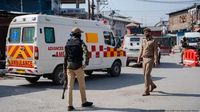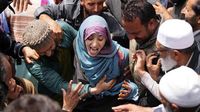Tension between India and Pakistan has escalated dramatically following a brutal attack in Indian-occupied Kashmir that left 26 people dead and numerous others injured. The attack, which occurred on April 22, 2025, in the picturesque town of Pahalgam, has been described by local authorities as one of the deadliest incidents involving civilians in recent years. Eyewitnesses reported that gunmen opened fire on a group of off-duty intelligence officers and tourists, prompting Indian police to label the incident a "terror attack" and blame militants opposed to Indian control in Kashmir.
The region’s chief minister, Omar Abdullah, expressed grave concern over the attack, stating it was “much larger than anything we’ve seen directed at civilians in recent years.” The assault has drawn international attention, notably coinciding with the visit of U.S. Vice President JD Vance to India, who offered assistance after visiting the Taj Mahal.
In response to the attack, Indian Prime Minister Narendra Modi cut short his trip to Saudi Arabia and returned to Delhi. Federal Home Minister Amit Shah visited survivors and the families of the deceased, emphasizing that those responsible would "not be spared" and that Bharat (India) would not bend to terror. Shah’s statements echoed the sentiments of many Indian leaders who have condemned the violence.
As the situation unfolded, India took significant diplomatic measures against Pakistan, which it accused of harboring militants responsible for the attack. On April 23, 2025, India announced the closure of a key border crossing, the suspension of the Indus Water Treaty, and the downgrading of diplomatic ties. Foreign Secretary Vikram Misri stated that these actions were taken due to the attack’s “cross-border” links to Pakistan, although no evidence was publicly provided to support this claim.
The Indus Water Treaty, established in 1960 and crucial for Pakistan’s agriculture, was suspended until Pakistan "credibly and irrevocably" renounces its support for cross-border terrorism. Misri also noted that several Pakistani diplomats in New Delhi were asked to leave, and Indian diplomats were recalled from Pakistan. The number of diplomatic officials from both countries will be reduced significantly starting May 1, 2025.
Pakistan’s Defence Minister Khawaja Asif denied any involvement in the attack, labeling it a domestic insurgency and condemning the violence. He asserted that Pakistan would respond to India’s actions following a high-level meeting chaired by Prime Minister Shehbaz Sharif. The Pakistani government expressed condolences to the victims’ families and emphasized its concern over the loss of life.
The Kashmir Resistance, a previously unknown militant group, claimed responsibility for the attack, stating that the targeted individuals were not "ordinary tourists" but were linked to Indian security agencies. This claim has not been independently verified, but it reflects the ongoing tensions and the complex nature of the conflict in the region.
The attack occurred in a remote meadow in Pahalgam, a location popular with tourists and religious pilgrims, accessible only by foot or horseback. Among the victims, 24 were Indian tourists, one was from Nepal, and another was a local guide. The violence has raised concerns about the safety of tourists in the region, which has experienced a recent boom in tourism despite a history of conflict.
In light of the attack, many tourists began to leave Kashmir, with reports of panic among visitors. Monojit Debnath, a tourist from Kolkata, expressed his concerns about safety, stating, "We are tourists, and we should think about what safety we have here for us." Abdullah lamented the exodus of tourists, acknowledging their understandable fear in the wake of such violence.
Security has been intensified across the region, with Indian forces launching a manhunt for the assailants. Thousands of police and soldiers have been deployed, setting up additional checkpoints and conducting searches in the area. The Indian Defense Minister Rajnath Singh vowed to track down not only the perpetrators but also those who conspired to commit the attack.
The Pahalgam attack follows a pattern of violence in Kashmir that has often coincided with high-profile diplomatic visits. Historical incidents, such as the 2000 Chittisinghpora massacre and the 2002 Kaluchak attack, illustrate how armed groups have exploited such moments to stage attacks, drawing international attention to their cause.
Kashmir has been a flashpoint of conflict between India and Pakistan since both nations gained independence in 1947. The region has been divided between the two countries, with each claiming it in full but controlling different parts. An armed insurgency began in the late 1980s, with India accusing Pakistan of supporting militants. Tensions escalated further in 2019 when the Indian government revoked Article 370, stripping Jammu and Kashmir of its special status and leading to increased military presence and restrictions in the region.
As the Indian government grapples with the implications of this latest violence, the attack has sparked renewed debates about security, governance, and the ongoing conflict in Kashmir. The international community has condemned the attack, with leaders expressing solidarity with the victims and their families. The situation remains fluid as both India and Pakistan navigate the repercussions of this tragic event.
In summary, the Pahalgam attack has not only claimed lives but has also reignited tensions between two nuclear-armed neighbors, raising questions about the future of peace and stability in a region long plagued by violence.





